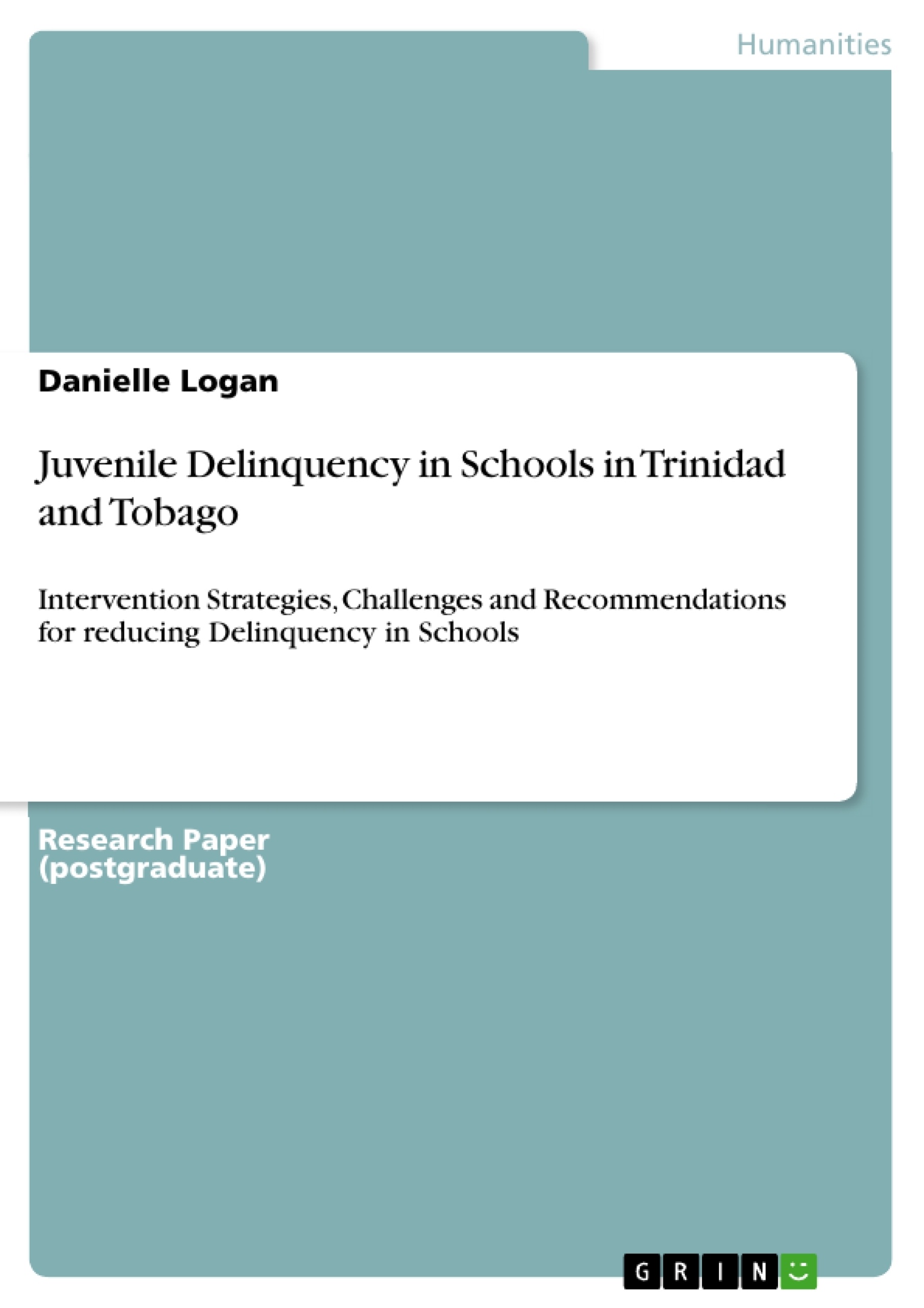This paper seeks to highlight juvenile delinquency in Trinidad and Tobago particularly within the school system which has become at the centre of attention recently. It explores some of the theories that can be used to explain delinquency in the school system. The author places much attention on the programmes that can be used to alleviate if not eliminate juvenile delinquency in schools throughout Trinidad and Tobago. The challenges and recommendations of these programmes were also highlighted in order to maximize its success.
Inhaltsverzeichnis (Table of Contents)
- Executive Summary
- Introduction
- Synopsis of School System in Trinidad and Tobago
- Conceptual Framework
- Theoretical Explanations of Juvenile Delinquency
- Costs of Juvenile Delinquency
- Intervention Strategies within the School Setting
- Challenges
- Recommendations
Zielsetzung und Themenschwerpunkte (Objectives and Key Themes)
This paper aims to examine the issue of juvenile delinquency within the Trinidad and Tobago school system, exploring contributing theories and outlining potential intervention strategies. The study also addresses challenges to implementing these strategies and offers recommendations for improvement.
- Juvenile delinquency in Trinidad and Tobago schools
- Theories explaining juvenile delinquency
- Intervention strategies for reducing delinquency
- Challenges in implementing intervention strategies
- Recommendations for improving intervention strategies
Zusammenfassung der Kapitel (Chapter Summaries)
Introduction: This chapter introduces the growing problem of juvenile delinquency in Trinidad and Tobago, highlighting its significance as a contributing factor to broader societal crime. It cites a recent increase in youth crime reported by the Minister of National Security, attributing the rise to factors including gang activity, firearm availability, drug trade, and school-based delinquency. The chapter emphasizes the focus on school-based juvenile delinquency, particularly since the abolition of corporal punishment in 1999, noting increased disruptive behavior, disrespect, fighting, substance use, theft, and bullying as key issues.
Synopsis of the School System in Trinidad and Tobago: This section provides a historical overview of the Trinidadian and Tobagonian education system, tracing its origins in the class-oriented British colonial system and its legacy of inequality. It describes the current three-tiered system (pre-school, primary, and secondary) and the division into private, government-assisted, and government schools. The chapter highlights the socioeconomic disparities reflected in school choice, with private schools attracting mainly upper and middle-class students and government schools largely serving lower-class students. The research, however, focuses solely on the lower levels of the education system, excluding tertiary education.
Schlüsselwörter (Keywords)
Juvenile delinquency, Trinidad and Tobago, school system, intervention strategies, challenges, recommendations, crime, education, social inequality, corporal punishment, bullying, gangs, drug use.
Frequently Asked Questions: A Comprehensive Language Preview of Juvenile Delinquency in Trinidad and Tobago Schools
What is the overall focus of this document?
This document provides a comprehensive overview of juvenile delinquency within the Trinidad and Tobago school system. It examines contributing factors, explores relevant theories, outlines potential intervention strategies, addresses challenges in implementation, and offers recommendations for improvement.
What topics are covered in the Table of Contents?
The document covers an executive summary, introduction, a synopsis of the Trinidad and Tobago school system, a conceptual framework, theoretical explanations of juvenile delinquency, the costs of juvenile delinquency, intervention strategies within the school setting, challenges encountered, and concluding recommendations.
What are the key objectives and themes explored?
The main objectives are to examine juvenile delinquency in Trinidad and Tobago schools, explore contributing theories, and outline intervention strategies. Key themes include the prevalence of juvenile delinquency, relevant explanatory theories, effective intervention strategies, challenges in implementation, and recommendations for improvement.
What is the historical context provided regarding the Trinidad and Tobago school system?
The document provides a historical overview of the Trinidadian and Tobagonian education system, tracing its origins in the class-oriented British colonial system and its legacy of inequality. It describes the current three-tiered system (pre-school, primary, and secondary) and the division into private, government-assisted, and government schools, highlighting socioeconomic disparities in school choice.
What are some of the key issues related to juvenile delinquency discussed in the introduction?
The introduction highlights the growing problem of juvenile delinquency in Trinidad and Tobago, linking it to broader societal crime. It notes a recent increase in youth crime, attributing the rise to factors such as gang activity, firearm availability, drug trade, and school-based delinquency. The abolition of corporal punishment in 1999 is mentioned as a potentially contributing factor to increased disruptive behavior, disrespect, fighting, substance use, theft, and bullying.
What types of intervention strategies are considered?
While the specific intervention strategies aren't detailed in this preview, the document promises to explore potential intervention strategies for reducing delinquency within the school setting.
What challenges to implementing intervention strategies are addressed?
The preview indicates that the document addresses the challenges involved in implementing effective intervention strategies to combat juvenile delinquency in Trinidad and Tobago schools.
What recommendations are offered?
The document promises to offer recommendations for improving intervention strategies to address juvenile delinquency more effectively. Specific recommendations are not included in this preview.
What are the keywords associated with this document?
The keywords include: Juvenile delinquency, Trinidad and Tobago, school system, intervention strategies, challenges, recommendations, crime, education, social inequality, corporal punishment, bullying, gangs, drug use.
What is the scope of the research regarding the education system?
The research focuses solely on the lower levels of the education system (pre-school, primary, and secondary), excluding tertiary education.
- Quote paper
- Danielle Logan (Author), 2011, Juvenile Delinquency in Schools in Trinidad and Tobago, Munich, GRIN Verlag, https://www.grin.com/document/207850



